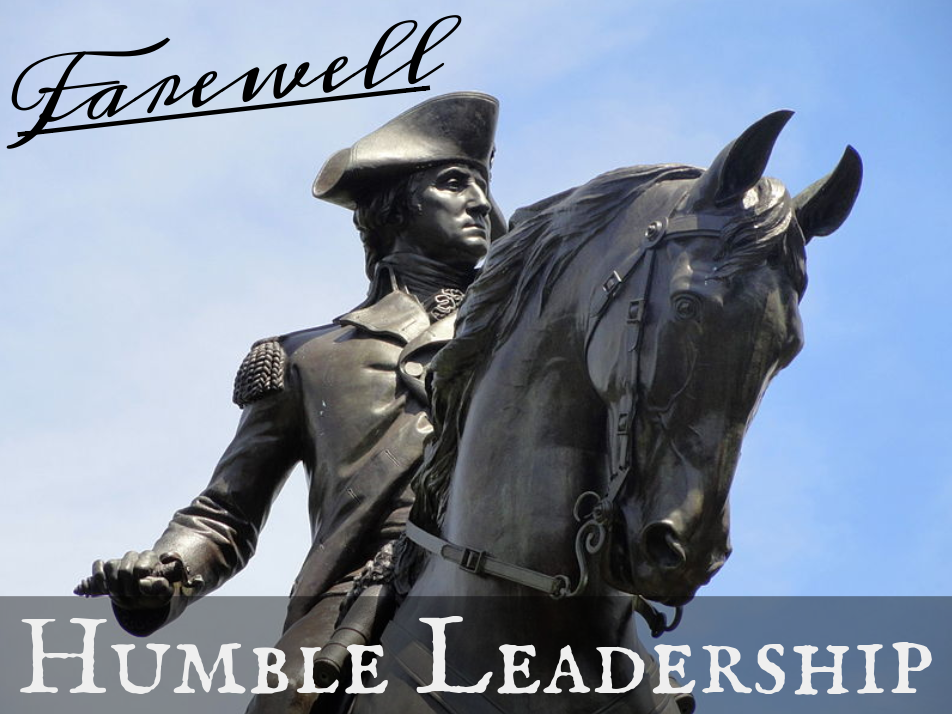The impressions with which I first undertook the arduous trust were explained on the proper occasion. In the discharge of this trust, I will only say that I have, with good intentions, contributed towards the organization and administration of the government the best exertions of which a very fallible judgment was capable.
Not unconscious in the outset of the inferiority of my qualifications, experience in my own eyes, perhaps still more in the eyes of others, has strengthened the motives to diffidence of myself; and every day the increasing weight of years admonishes me more and more that the shade of retirement is as necessary to me as it will be welcome.
Satisfied that if any circumstances have given peculiar value to my services, they were temporary, I have the consolation to believe that, while choice and prudence invite me to quit the political scene, patriotism does not forbid it.”
Determination
One very striking part of Washington’s Farewell Address is how often he justifies his intention to retire. He really belabors the point, giving multiple different reasons and arguments to support his decision.
Some might look at this and think that perhaps he was not totally sure of his decision and therefore was almost trying to convince himself through this process of multiple arguments and reasons. However, I look at it a different way.
I think that over his tenure, each of these reasons and arguments had presented themselves at one time or another. Taken separately, they were not enough in Washington’s mind to convince him that his inclination toward retirement was compatible with the duty he had to his country. However, after a long career, the reasons and arguments had built up to the degree that he felt justified in his choice.
There was still one more ingredient that was required though. In order for Washington to finally make the leap, he had to know that America was settled, that freedom had truly taken root. Washington had his ear to the heartbeat of the country and knew in 1796 that the time he had waited for had finally come.
Good Intentions, Best Exertions
Washington was one of a small handful of men who could claim to have participated in both the organization and the administration of the new government of the United States. Really take a minute and try to imagine the sheer weight of responsibility, the utter overwhelmingness of that task.
Forming the government of a new country is not a skill that you can really actively prepare for. There are, no doubt, certain qualities, abilities and knowledge that would come in handy if you were to undertake such a task. Yet there is no “New Government Formation 101” class. Washington and his fellow Founders were trying their hand at a brand new thing.
History demonstrates that Washington definitely had the correct qualities, abilities and knowledge. He had what it took. However, Washington did not see it that way. In his eyes, the only thing he brought to the table were good intentions backed by his best exertions.
In other words, Washington loved freedom and genuinely wanted to see it prevail (good intentions) and so he gave all he could give to see those intentions through (best exertions). A love for freedom and hard work. In Washington’s mind, that was all he had to give.
Imagine our country today if we had leaders with this kind of attitude.
Fallible Judgement, Inferior Qualifications
If someone was running for office and their campaign slogan was “Fallible Judgement, Inferior Qualifications”, chances are they would not sweep the election. We want leaders that are confident in themselves and inspire confidence in others.
The problem is, too often we confuse confidence with pride and humility with weakness.
Washington was capable and by this time quite accomplished. Yet he let his actions do the talking for him. Instead of touting his qualifications and abilities, he remained humble and spoke honestly about how he viewed himself.
George Washington did not have to run a campaign to the tune of millions of dollars when he was elected to be president. Why? Because he was honest, humble, and only had the best interest of America at heart.
Today
There are so many lessons that we can take from Washington’s Farewell Address. First, we get a glimpse of his determination. Washington had a goal and determinedly pressed toward it no matter what.
But when you boil it all down, the essence of this passage is humble leadership. It really gives you a sense of Washington’s perspective on himself. Even after leading the Continental Army to victory over the British (the largest, most professional military in the world at the time), overseeing the founding of a new country, he was still humble, still mindful of his own faults and shortcomings.
But despite this, Washington approached each new challenge with 2 things – good intentions and his best exertions.
These good intentions were not just wishy-washy hopes and dreams. They were a true, sincere desire to see freedom triumph and flourish. And beyond that, they were backed up with his best exertions. Nothing less than his best. Exertion is not a word we use often these days, but it has the feel of intense effort, strain, struggle. He put everything into it. Everything.
This kind of humble leadership is what America is missing today. I firmly believe that we are all called to be leaders. Are you this kind of leader? A humble one, who understands your faults, but pushes past them with the best, sincere intentions in the interest of others? Pushes past them with extreme, full-on exertion?














